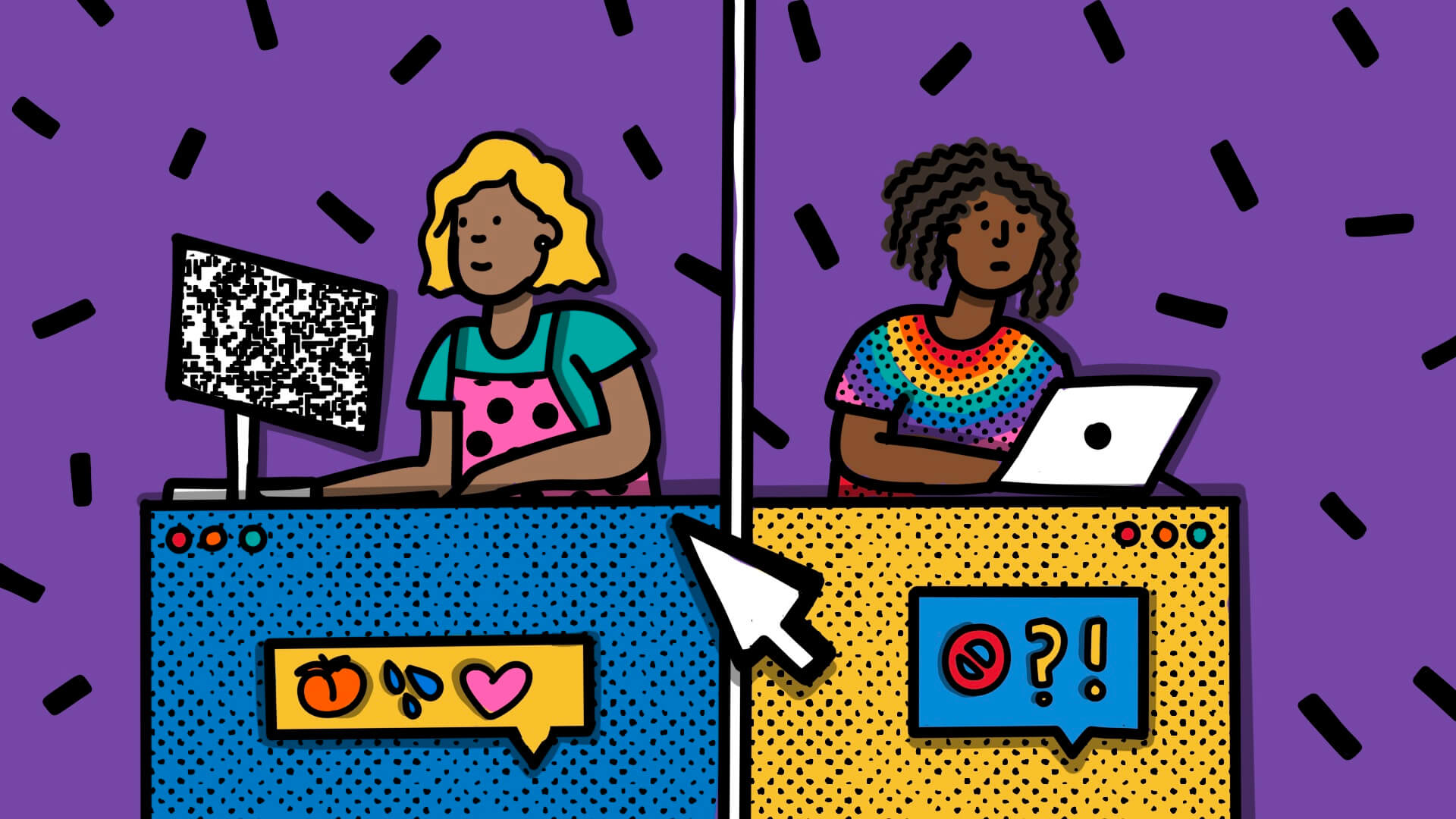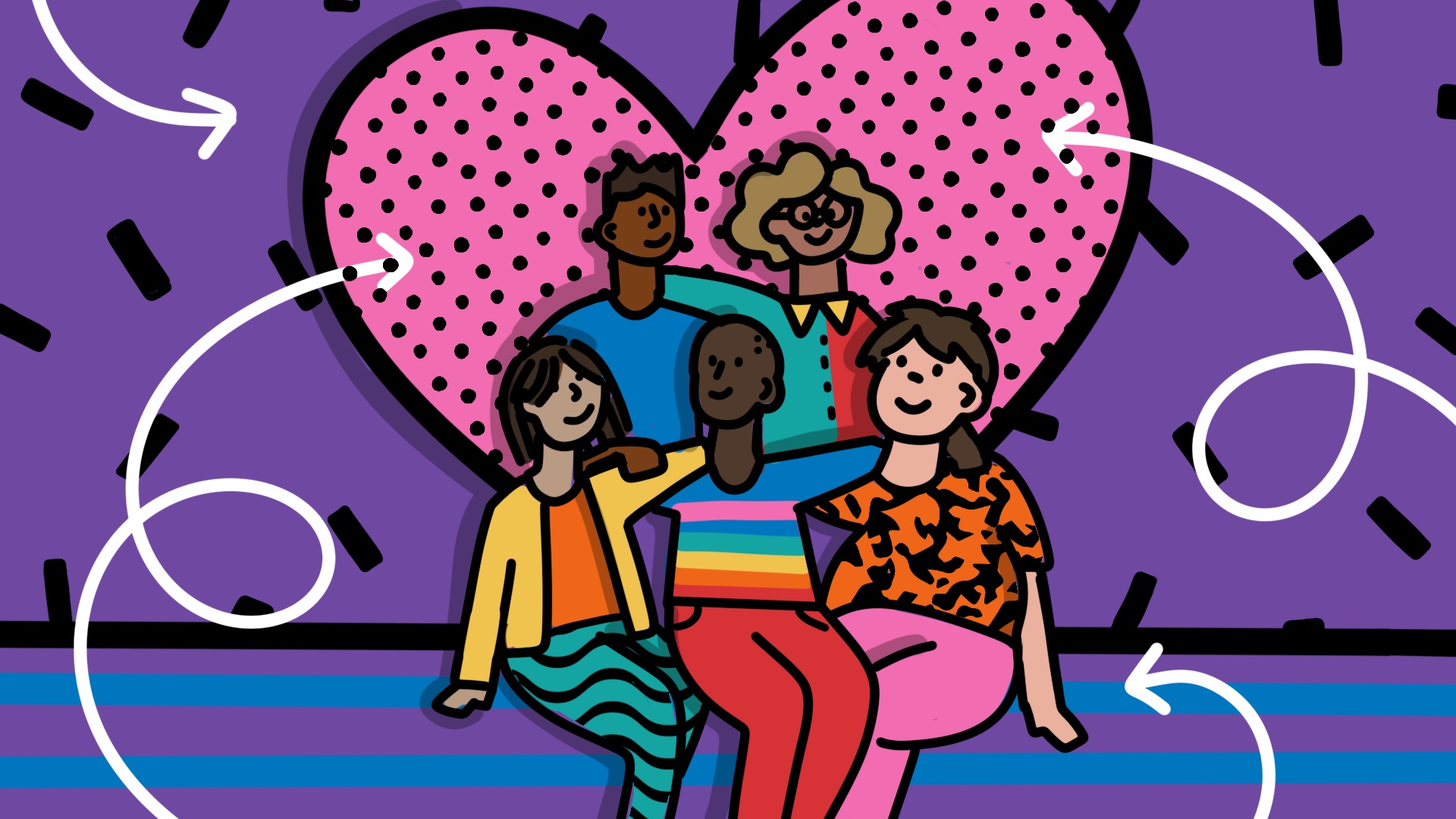Queeries: How can I protect my mental health while community organising?
This month, our Fagony Aunt guides a reader through the complex emotions and challenges that community organising can raise.
Aisha Mirza
29 Sep 2022

Soofiya
Welcome to Queeries, Aisha Mirza’s advice column at gal-dem. You can follow more of Aisha’s writings and work on Substack here.
Dear Fagony,
Based on my own bad experiences, I really worry about the future of community organising and radical spaces. Looking back at the history of so many important spaces, it seems like everything closes and usually because of in-fighting! Maybe there isn’t enough empathy to go around… I don’t know what it is, but social justice spaces can be scary and I’ve seen so many great people bow out because their wellbeing cannot take the intensity of it. Anyway, I guess my question is how can we organise while also protecting our mental health?
From,
Worrying Wombat
Dearest Worrying Wombat,
Ngl, I haven’t been looking forward to answering this question. Between it being too close to home, too depressing, and me simply not knowing the answer, I was wondering if I really wanna go there. But then I thought, who wants the Wombat to Worry? Not I! Also, I have been involved in community organising since I was 15 which is over half my life (yes I’m a masochist ;)), and it has left me pondering and recovering from the exact reality you share here. Despite it all, like you, I’m still invested.
Before we get into the problem-solving that we love so much, I want to say that I witness and recognise the hurt in your voice. I feel the skin scabbing over in its best attempt to heal after being burned by the community organising fire. I understand deeply the unfathomable exhaustion inherent in learning these painful lessons first hand. And I’m moved by the hope in your question. Optimism, strategy and critical thought are some of the pillars of our movements. But I also want to take a moment for pure emotion. I want to scream: I am sorry for what you’ve gone through! I wish it wasn’t like this! You didn’t deserve that! Thank you for still caring! Your existence is a gift!
Let me take you back to 2010. I was fresh out of university and deep in my white feminism era (hey – someone had to walk so you could fly). In the fight to push back against the Tories’ merciless cuts to public services, I was surrounded by straight, white, middle-class activists. Inevitably, I went mad. Some years later, back on my feet with a criminal record, a better understanding of who I am, and an undimmable hunger for that sweet social justice, I vowed only to organise with fellow QTIBPOC for QTIBPOC liberation. I understood by then that being hurt was inherent in organising work. I figured if it had to happen, I’d rather it be at the hands of those whose freedom I am invested in, those with whom I share a wound. That’s part of the work, right?
“Optimism, strategy and critical thought are some of the pillars of our movements. But I also want to take a moment for pure emotion”
In the many years since making that pledge, I have been stalked, blackmailed, lied about, experienced so much misogyny, have hurt people, have lost my faith in the goodness of community and the strength of our movement, have had it pieced back together with so much love. The good has far, far outweighed the bad, but the bad has been potent. Does liberation have to be traumatising?
Clearly you know this, but taking on the work of organising for social justice attracts a lot of marginalised people, because we are the ones who give a fuck. We are in pain because we have been hurt in our personal and ancestral lives repeatedly, unjustly, mercilessly. Together, under the strain of fighting a system that is built on our exploitation, we become (as well as a lot of good things) a pressure cooker of expectation, resentment and mummy issues.
We are united by the desire to burn everything down and sometimes that energy is brought into spaces where everyone is vulnerable and in fact nothing should be burnt down. The ability to discern what and who needs to be destroyed can be lost, with people reaching instead for whatever is closest. Our higher selves can approach this with curiosity and compassion while the rest of us become destroyed by what we witness. We’re all in this weird trap of knowing the strain of community organising probably won’t ease until people have their basic needs met, but that people won’t get their needs met without community organising?
“Taking on the work of organising for social justice attracts a lot of marginalised people, because we are the ones who give a fuck”
It is woefully inevitable that we reproduce the oppression, power dynamics and binary carcerality of the world that raised us. I know this can feel gutting when we see ourselves complicit in these cruelties, or have them enacted upon us. But those dynamics among marginalised people are not exactly the same, because we are not the same as the people who benefit from them. We are working against capitalist individualism by centering the community. It’s messy af, but we are united in wanting something better, and in that there’s hope.
Here are some of my non-exhaustive experience-based thoughts on how to be more caring and careful in community organising spaces:
KNOW WHO YOUR FRIENDS ARE. This sounds bleak, I know, but here’s the scoop. I think when we come together, bound by hardship, we tend to come baring our souls. We assume due to shared identity markers that don’t actually tell us much about who someone is, or how they view the world, that we are operating within the same value systems or want the same things. Hold off! Get to know people, listen to your gut, go slow. Pay attention when adversity hits – the people you’re meant to be rising up with will reveal themselves.
FOR THE LOVE OF GOD, BOUNDARIES. We have a tendency to want to be best friends with everyone. Community organising circles become friendship circles become friends with benefits circles become frenemy circles become mentors, stand-in parental figures, loan-sharks etc. It’s not our fault! We have big hearts, big dreams and an existential loneliness like no other. This can be really painful though. Know who your friends and support networks are outside of your community organising bubble, and if you don’t, work on that first for your safety. Of course different facets of our lives will converge – it’s the nature of community. But understand what your boundaries are, and what the boundaries of the group are, and honour them.
BE CLEAR. We can’t assume that our intentions or even our actions are being interpreted in the way we mean them. It’s on all of us to be as clear and communicative as possible about what our needs, desires and boundaries are. When something resonates, give affirmation. When something feels off, raise it respectfully before it becomes something bigger. Write things down. Be organised. Be clear about the aims of the project. Not every group is non-hierarchical, and that’s OK – best to be super clear about that though. Some version of contracts, unsexy though they are, can be a useful tool for knowing where you and others stand.
TRANSPARENT FINANCES. We all know money gets people fucked up. Being completely transparent about how much money there is (or let’s face it, isn’t!) and where it’s going, in some kind of open document, feels like a must.
LEARN FROM OTHERS. This work is so consuming that sometimes we forget to pause, look around, and remember we are part of a movement so much bigger than us and our chosen cause. Talk to and learn from people who are doing or have done similar things in different places (especially older people!), people who have had resonant experiences to yours, people actively working on answering these difficult questions about the sustainability of radical movements such as Healing Justice London & Seeds for Change.
WELCOME CONFLICT. Conflict will always occur within a community and can sometimes be generative. I think we’re all getting better at accepting and preparing for that. To be clear, that does not mean we should ever expect to be abused or disrespected, and we should all know what our personal limits are. Talk about conflict in your group before it happens. Luckily, there are loads of thinkers and resources devoted to how to see conflict coming and compassionately deal with it. Check out Leah Lakshmi Piepzna-Samarasinha, adrienne maree brown, Mariame Kaba, Ejeris Dixon, and Mia Mingus.
MEDIATION. There are people whose actual job it is to support radical communities who want things to be better, to do so in a kinder and more intentional way. I wish we lived in a reality where we all had access to mediators all the time, but many do offer subsidised or sliding-scale services. Maybe we can work towards building in regular time with mediators whether there’s active conflict or not. Having some neutral, outside eyes on our projects and all their interpersonal weavings is such a gift. UK-based Cradle Community are doing awe-inspiring work.
RESIST URGENCY. The work of liberation for oppressed people is the most important. With that can come a huge sense of responsibility and urgency. The drive to keep going, often underfunded, under-resourced and under-prepared results only in burn-out and heartbreak. We can’t do it all, and we mustn’t at the cost of our and other people’s health. Resist expectations, capitalist productivity and urgency. Go slow.
BREATHE. The work of advocating and building with marginalised communities takes a huge toll on the body and spirit. We deserve to learn embodiment tools that can nourish and protect us, such as The Resilience Toolkit. What would it feel like, if somatic healing practices were central to our community work?
IT’S BETWEEN YOU AND GOD. I am a deeply unreligious person, however, I’ve found myself returning to this mantra. It’s about the deep and spiritual work of understanding who I am, investigating why I make the choices I do, working out how to do better, righting my wrongs where necessary, and fostering compassion and strength within myself. You will not be liked or understood by everyone, and not every conflict will be tied up with a pretty pink bow. In the quiet hours you may need to be real with yourself about what you owe others, and what you absolutely do not.
WORK WITH CHILDREN, ANIMALS & PLANTS. No, seriously. Unlike the showbiz mantra, remember there’s so much healing work to be done adjacent to or somewhat outside of adult human life. It helps!!
CELEBRATE. Make space to celebrate and record (y)our wins together and alone. Everytime someone says something nice or thanks you for your work, write it down or print it out and make a little affirmation book to look back on. Despite it all, you’re doing god’s work. We all are.
If you would like to submit a question to Aisha for a future Queeries, please use our confidential, anonymised submission form.
Like what you’re reading? Our groundbreaking journalism relies on the crucial support of a community of gal-dem members. We would not be able to continue to hold truth to power in this industry without them, and you can support us from £5 per month – less than a weekly coffee.
Our members get exclusive access to events, discounts from independent brands, newsletters from our editors, quarterly gifts, print magazines, and so much more!








